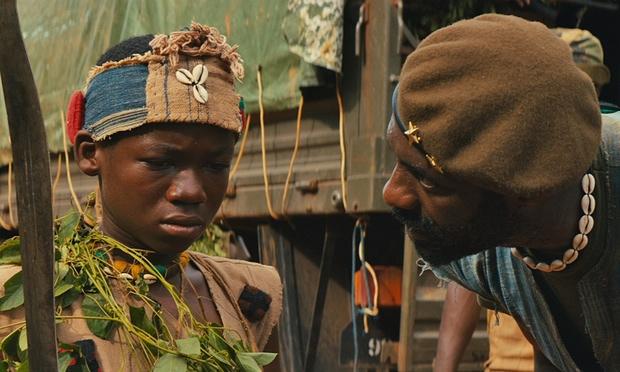“Beasts of No Nation” Review
In a village within a war-torn West African country, a family lives with the looming threat of conflict destroying their comfortable life. This threat becomes very real when an invasion by anti-government rebels leaves a young boy named Agu as the only surviving member of the family. Agu is discovered by the leader of the rebels, known as the Commandant, who takes him into the group to be trained as a child soldier. These events are the very beginning of Netflix’s first movie release, “Beasts of No Nation.” If “Beasts of Nation” is an indication of Netflix’s future movie releases, Netflix users are in for an amazing catalog of movies.
The story is a character piece, following Agu’s transformation into a child soldier. The narrative completely succeeds in making the transformation believable and emotionally gripping, and there is not a single dull moment throughout the entirety of “Beasts of No Nation.” The movie is excellent thanks to a variety of sources, the most notable being the skill of the director (who is also the writer, cinematographer, and producer of the movie), Cary Fukunaga, and the acting ability of Abraham Atta as Agu and Idris Elba as the Commandant. Atta expresses Agu’s emotions perfectly, which is even more impressive given that this is Atta’s first time acting. While Atta excels at showing, Idris Elba is just as good at telling. Elba is charismatic as the Commandant, and his charisma and confidence in what he is saying is magnetic; every scene Elba is in grabs the viewer’s attention and holds it from start to finish.
The only flaw with “Beasts of No Nation” is it fumbles its handling of themes of religion, the ambiguity of faith, and personal responsibility. Agu was raised in a religious family, and the conflict between his values and belief in a higher power versus the atrocities he witnesses and commits is large part of the narrative. Most of Agu’s narration consists of his questioning of why all of the horrible crimes committed throughout the story are allowed to happen if there supposedly is an omnipotent god overseeing the world, but this narration is rendered pointless by a scene that happens very early on in the movie, where Agu is saved from death thanks to what is heavily implied to be divine intervention. The scene comes completely out of nowhere and is never brought up again, and adds a mystical element to an otherwise completely grounded movie. While the rest of the movie is amazing, this one scene makes key themes of “Beasts of No Nation” completely pointless by giving the audience a direct answer to a question best left unanswered.
“Beasts of No Nation” is a film with very dark subject matter, with torture, murder, and mass executions of being only a few of the atrocities featured throughout the events of the story, but it does not relish in the violence. Fukunaga shows only what is necessary to make the audience understand the reprehensibility of the atrocities, and focuses more on the effect it has on both the victims and perpetrators. If the viewer can handle dark and brutal subject matter enough to watch “Beasts of No Nation,” they will find it to be a highly effective film that handles the material carefully in order to make a statement rather than throwing it at the viewer to try and shock them.
“Beasts of No Nation” is a masterpiece in every way: Fukunaga makes every shot beautiful, Abraham Atta and Idris Elba deliver riveting performances, the dark subject matter is handled perfectly and has a meaningful impact on the narrative, and the story of a child’s transformation into a desensitized killer is excellent and haunting. While the film does have a pointless scene that fumbles and ruins several key themes of the story, the faults of “Beasts of No Nation” do not hold a candle to the overall excellent quality of the movie. “Beasts of No Nation” is by far the best film of the decade.

